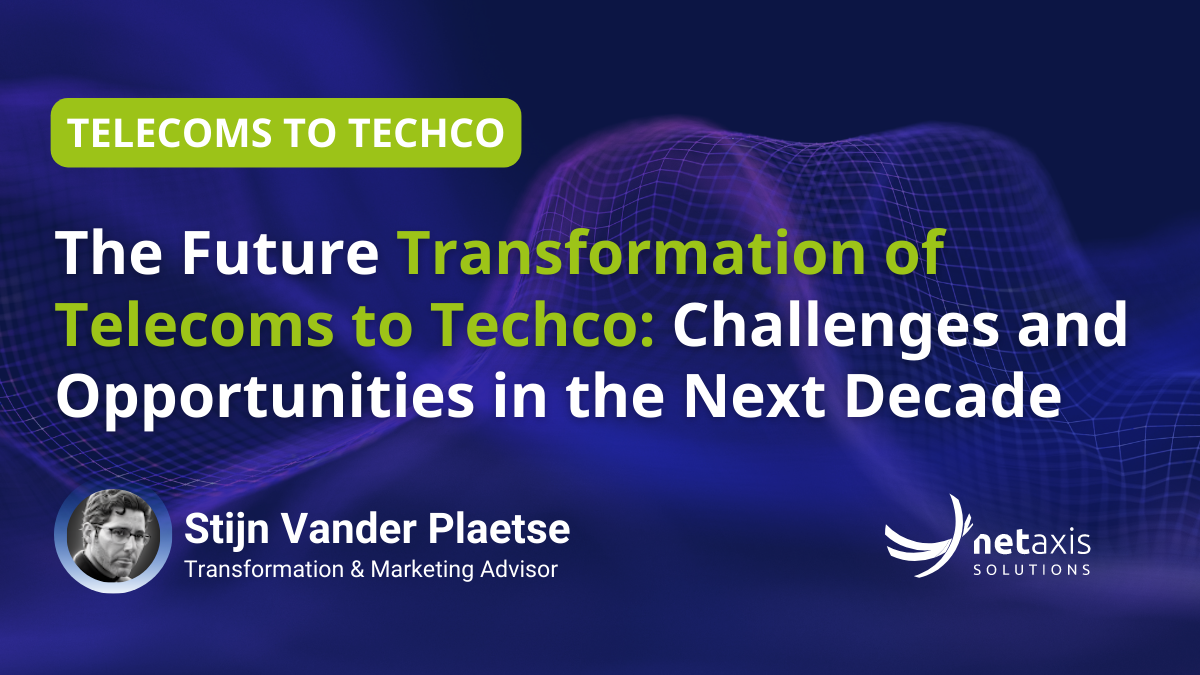The challenge: Technology – processes and people
In the next ten years, the communications industry is projected to transition from being predominantly network-driven to becoming even more software-oriented. This transformation, the metamorphosis from a traditional telecommunications company (telco) to a technology company (techco), is riddled with numerous challenges but also presents opportunities that could redefine the sector and its service offerings.
The transformation challenge: From telecoms to techco
The primary challenge lies in the fact that shifting from a network-driven to a software-driven model entails significant structural and operational changes. Traditionally, telecoms have been network-focused, with a heavy reliance on physical infrastructure. However, the techco model necessitates a paradigm shift towards software-defined networking (SDN) and network function virtualization (NFV), cloud, security, completed with numerous applications for target segments and sectors, which can be daunting tasks due to the complexity of these technologies and the potential resistance to change within the organisation.
Redefining user experience for the on-demand generation
Moreover, the increasing demand for a simplified user experience introduces another challenge. To cater to the ‘on-demand generation’, techcos must provide seamless, high-speed connectivity and easy-to-use, flexible services. Achieving this requires a high level of automation in service delivery and customer service, transforming not just the technological infrastructure, but also processes and workflows within the organisation.
Ensuring reliability and security in the techco future
Reliability and security are also paramount. As techcos will handle a more significant share of data and more complex digital services, ensuring data security, privacy, and robust service delivery will become increasingly challenging. Here, robust cybersecurity measures, data governance practices, and the assurance of service continuity will be critical.
Partnerships for the future: embracing the open ecosystem
The shift to techco also demands a redefinition of business partnerships. Future techcos must choose partners who embrace an open ecosystem mindset to encourage collaboration, innovation, and co-creation of value. Traditional models of competition are becoming obsolete in the face of a shared digital economy where partnerships, alliances, and shared platforms dominate.
Bridging the skills gap in the techco transformation
Another challenge lies in the skills gap. The transformation to techco requires a workforce proficient in software and digital technologies, which demands reskilling current employees and attracting new talents with the necessary skills. The need for new competencies, from data analytics to AI and machine learning, will put a premium on talent acquisition and retention strategies.
Conclusion: Innovation and growth in the journey from telecoms to techco
The journey from telecom to techco over the next decade is full of challenges, but with each hurdle comes an opportunity for innovation and growth. The push for simplification, high automation, and a shift towards an open ecosystem mindset will force telecoms to reimagine their business models, forging a path towards a more resilient, adaptable, and innovative future. This journey may be complex, but the rewards at the end will undoubtedly be worth the efforts.
Netaxis: A partner in the telecoms to techco transformation
Netaxis is an enabling partner in this transformative journey from telecom to techco. With its robust platforms, it expertly navigates the complex orchestration between different network elements and OSS/BSS systems, facilitating seamless integration and more efficient operations. Their advanced service routing platform capabilities allow for effective intercommunication between voice and non-voice platforms, including the rapidly expanding sector of Internet of Things (IoT) applications.
Notably, Netaxis Fusion, their unique platform, offers a powerful solution that enables Unified Communication (UC) applications in an automated way. Fusion acts as a catalyst in unlocking new revenue streams and business opportunities for techcos, by allowing them to swiftly adapt to changes and roll out new services with minimal effort. It eases the process of deploying, managing, and scaling UC applications, thus reducing time to market and enhancing customer experience.
As telecoms look to transition to techcos, Netaxis is well positioned to support this transformation with its innovative tools and customer-centric approach. Their capabilities not only facilitate the technical shift but also drive the cultural change towards a more open, collaborative, and digital-first mindset, helping telecoms realise their techco vision.





